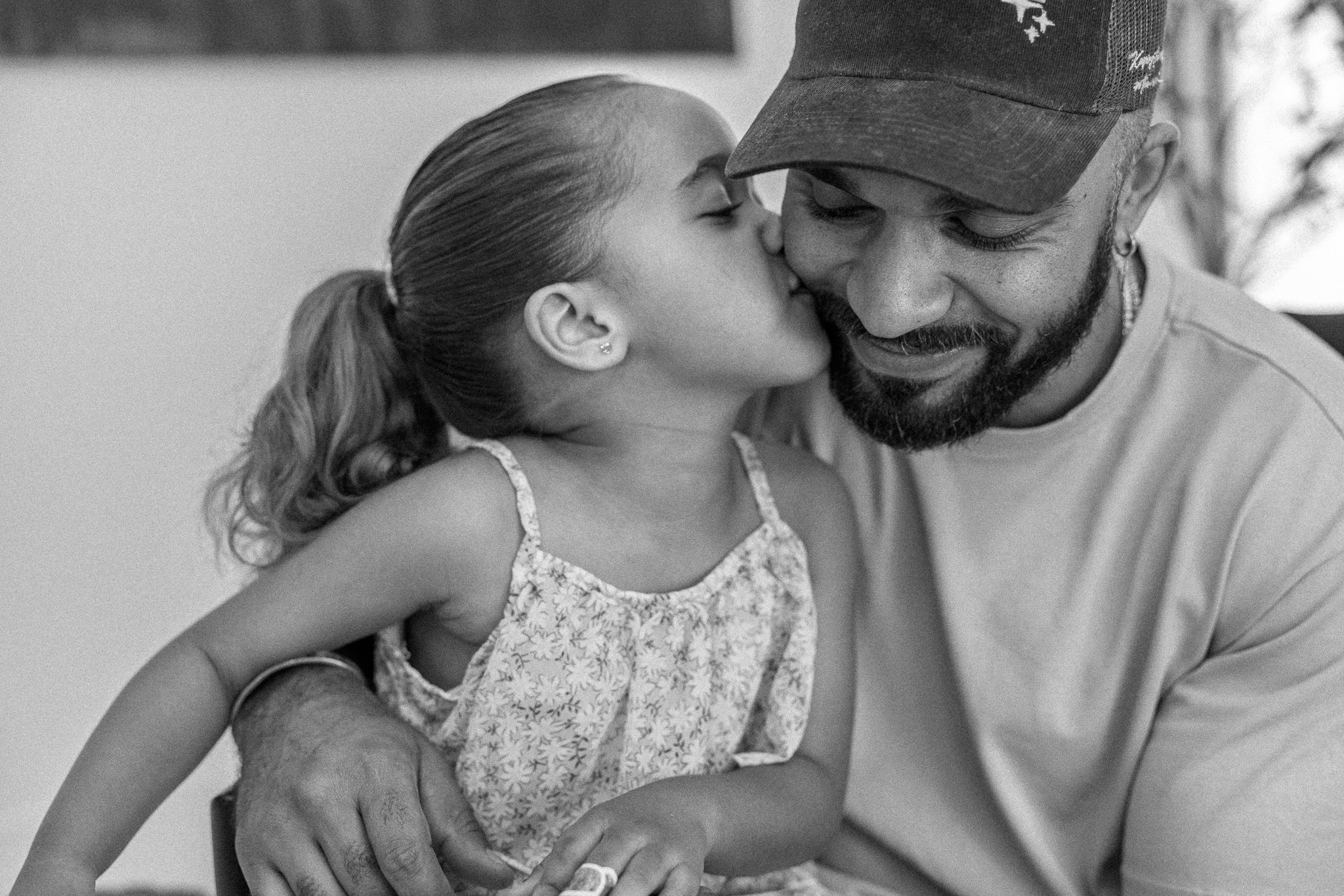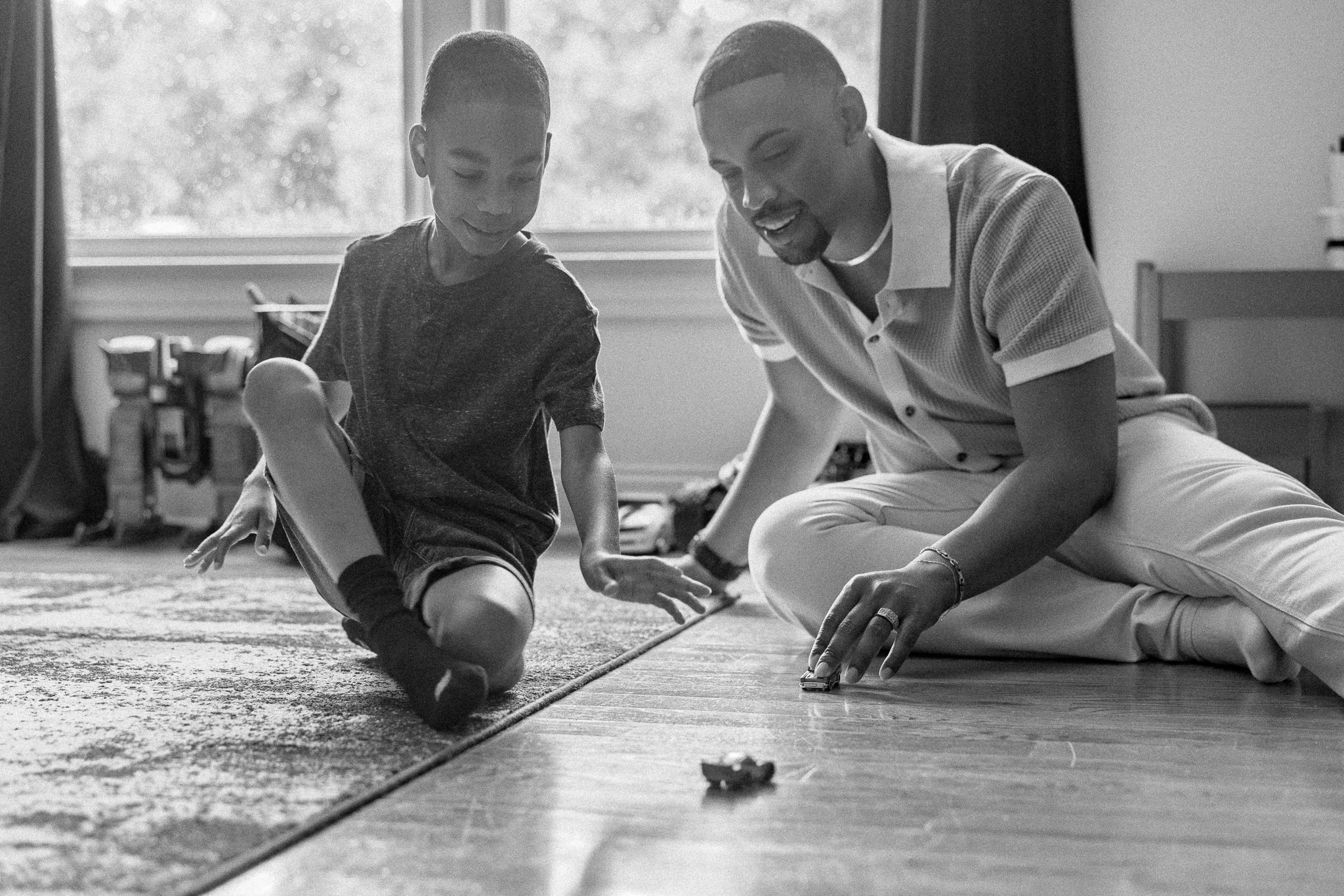
Brittany and Douglas Cain. Courtesy: @bellbellebella

Brittany and Douglas Cain. Courtesy: @bellbellebella
In order for me to write about our in vitro fertilization experience, you first have to know a little about my wife and our family structures growing up. I was born the first of three kids in the mid-80s in Augusta, GA and raised in Stone Mountain, GA. My brother and I are fraternal twins; most would argue that we were identical after having one look at us together. The baby of my family is my sister. She is three years our junior, and I can barely remember a time when I could physically look down on her. She stands 6’6” today and is in the midst of a very accomplished professional basketball career. My mother, a business professional turned college professor, and my father, a former college/pro football player with 25+ years procurement experience in energy, met in college at Clemson University in South Carolina. My brother, sister, and I were conceived the conventional way and, to my knowledge, have had no experience with infertility.
My wife, Brittney, was born on a military base in Southern California in the late 80s. She is the youngest of two. They were military kids traveling often but spent most of their formative years in South Florida and in Atlanta. Brittney’s oldest sister is four years her senior and is the mother of my four nieces and nephews, all 8 years and under (two boys two girls) and wife of a firefighter, my brother-in-law. Brittney’s mother is a recently retired nurse born in from the Caribbean. Her father is a marine veteran turned business executive from Chicago. Several members of her family have dealt with infertility.
Our marriage counselor/priest Father Henry told us, in marriage, sometimes you sing lead, and other times you need more cowbell. I knew during this chapter of our lives I was gonna play a MEAN A** cowbell.
Two very strong and involved family units are the driving force behind our IVF journey. Their support – emotional, financial, and spiritual cannot be quantified.
As I am writing this, I’m flying back from a business trip to Germany. This gives me a ton of time to gather my thoughts. I haven’t written anything like this since college, so please bear with my run-on sentences and jumbled ideas. No secret engineers make horrible writers, lol.
Until blacklove.com reached out to me about documenting IVF from a male perspective, I really didn’t think I had much to contribute. Having been at Brittney’s side throughout, and seeing the test of pain, patience, and emotional distress she endured just to get to a point where you hope to conceive, I saw myself as riding shotgun throughout the whole thing. Our marriage counselor/priest, Father Henry, told us, in marriage, sometimes you sing lead and other times you need more cowbell. I knew during this chapter of our lives I was gonna play a MEAN A** cowbell.

Courtesy: @bellbellebella
Brittney and I met in undergrad at Georgia Tech. We dated off and on as college kids do during that time but didn’t get serious until I graduated and was in business school. As Brittney finished up her undergrad studies, she would drive to Rome to see me. Brittney is definitely a city girl, so her driving the hour and change outside ATL to Rome, where deer and cattle outnumbered the people, really stood out. We became exclusive during that time and married 4 years later in August 2015. We took some time to travel and enjoy the “married, no kids” life until deciding to try and start a family in late 2016. Brittney started taking birth control in high school due to heavy periods. Honestly, while we were dating, I was focused on the advantages birth control provided me.
I always thought that once we decided to have kids, we’d just stop taking the pill, her body would need a month or two to reset, then BOOM pregnant. That reset stage lasted about 18 months, several fertility clinics, and thousands of dollars. We tried IUIs and they didn’t work. We even got pregnant on our own the conventional way, but we were diagnosed with a molar pregnancy around 10-11 weeks and miscarried. And, dawg, you talk about devastation. We were DONE-Done. Just a lot of crying, a whole lot. I have always been a super optimistic guy, so when we got pregnant, I’d always tell Brittney not to worry, the baby would be fine, we didn’t need IVF, etc. Even after the miscarriage, I found myself saying to her, if we did it once we can do it again! The more we researched, and the more time that went by, we realized we needed to step our game up.
I always thought that once we decided to have kids, we’d just stop taking the pill, her body would need a month or two to reset, then BOOM pregnant.
Time for IVF. I understand the textbook definition, but if you were to ask me how it worked, I’d describe it like this: there were a TON of doctors’ visits, blood tests, and shots – too many shots. Brittney took them like a G though and kept taking them. Her butt is probably still numb. I hate to even complain about this because I didn’t have to go through a fraction of the uncomfortable experiences my wife did, but that sticky couch deal in the “male sample room” at these places was top 10 creepy – I wouldn’t even sit down.
The people at our second fertility clinic were awesome. From the ladies working the front desk, to the nurses doing blood work, to the two doctors who handled our care – all amazing. They really made the process bearable and continued to encourage faith and optimism.
Brittney’s attitude towards IVF shifted from devastation from the miscarriage, to curiosity about IVF, to optimism in the beginning of the process, to fatigue and a determined finish. These emotional changes, and the general IVF process, forced me to pay more attention to my wife. Scheduling became our number one priority. One shot in the morning and one shot at night at the same times daily. Flexible work environments that allowed for last minute doctors’ visits that would cause you to miss half or a full day. Constant communication on physical or mental roadblocks and ailments. Oh yeah, and MONEY! Lots of money! It seemed like all the things folks talk about before you say I DO were all coming at us literally at the same time, and I’m out here trying to serve face and give that cowbell the business.
These emotional changes, and the general IVF process, forced me to pay more attention to my wife.
Let’s talk money. Now, this money thing deserves its own book much less an article, but I’m gonna give you about 200 words here. Having medical care that covers any portion of IVF treatment as a part of your benefits package is not likely at all. In Atlanta, there are probably 10 or so companies that cover any part of IVF treatments. Atlanta is one of the fastest growing cities for Fortune 500 – 100 companies, and you’re telling me only 10 say anything about IVF in medical coverage? It’s hard not to be jealous of those who live in states or countries where fertility coverage is a mandate. The most expensive thing in the IVF process is the objectively given medication, by far. Your best bet is to find a company that has coverage, be it a lifetime maximum or outright, for fertility coverage.

Courtesy: @bellbellebella
I decided to change jobs a few months before we were due to start IVF. The two largest factors in my job search were fertility coverage, location close to our home, and a boss who didn’t mind allowing flexible work hours. I found all three with my current job. And the kicker is, during my first meeting with my new boss he told me he and his wife were going through IVF too. They are a few weeks ahead of us in their pregnancy. If that wasn’t a sign from God, I don’t know what is.
Brittney handled the physical toll as well as I’d seen her handle anything. The social piece of the matter affected her the most. And when I say social, I mean your friends, friends of friends, new couples that want to get to know you, relatives, and every one of the sort that’s around you who aren’t familiar with infertility. There is a stigma out there that it’s like making babies in a test tube. And people plain just don’t know what to say. The common question after you get married is, when are you going to have kids? To someone struggling with infertility, that can be tough to answer. Some may sidestep the question, others may pretend they are waiting for the right time, but if you are my wife, she will answer you head on. When she goes into our infertility journey and what we were going through to conceive, people either clam up or have that “this was more than I expected” look. Brittney has changed her entire social media presence to covering and advocating for infertility. She speaks passionately about it, and I couldn’t be prouder of her for leaning all the way in. Check it out @bellbellebella.
It’s especially important for the men or women playing the support role in all this to realize it’s ok to play the tambourine, the cowbell, be a PIP no Gladys, or a Temptation when David Ruffin is acting out.

Courtesy: @dougcain5
So, here we are finally pregnant. Once you get to the pregnancy stage, literally everything is the same as any other pregnant couple. Everything physically and how you are treated is “normal”, but we don’t feel the same. No more shots, you go to the regular ole OBGYN, and get the same sonograms. After seeing your spouse go through something like that, you find a sense of relief that it’s over. There is a part of me that misses the extra attention and care she got from our IVF family at the clinic. I believe that really allowed Brittney to flourish and push through to get to the peaks and valleys of the process.
Now we are getting the house ready for the baby and trying to share our experiences with as many people as possible. It’s especially important for the men or women playing the support role in all this to realize, it’s ok to play the tambourine, the cowbell, be a PIP no Gladys, or a Temptation when David Ruffin is acting out. Just know that support means the world to the woman that is your world carrying what will become your world. And it’s a beautiful thing.
Related Articles
Bozoma Saint John talks Black motherhood, grief, self-love, and finding joy again. Don’t miss her powerful conversation on building legacy and living boldly.
Tyler Lepley shows the beauty of Black fatherhood, blended family life with Miracle Watts, & raising his three children in this Father Noir spotlight.
Black fathers Terrell and Jarius Joseph redefines modern fatherhood through love, resilience, unapologetic visibility in this Father Noir highlight.
Featured Articles
When Elitia and Cullen Mattox found each other, they decided that they wanted their new relationship together, their union, to be healthier and different.
Celebrate their marriage and partnership with the release of the documentary “Time II: Unfinished Business”
The vision for our engagement shoot was to celebrate ourselves as a Young Power Couple with an upcoming wedding, celebrating our five year anniversary - glammed up and taking over New York.
Meagan Good and DeVon Franklin’s new relationships are a testament to healing, growth, and the belief that love can find you again when you least expect it.
Our intent is to share love so that people can see, like love really conquers everything. Topics like marriage and finance, Black relationships and parenting.
HEY CHI-TOWN, who’s hungry?! In honor of #BlackBusinessMonth, we teamed up with @eatokratheapp, a Black-owned app designed to connect you with some of the best #BlackOwnedRestaurants in YOUR city – and this week, we’re highlighting some of Chicago’s best!











